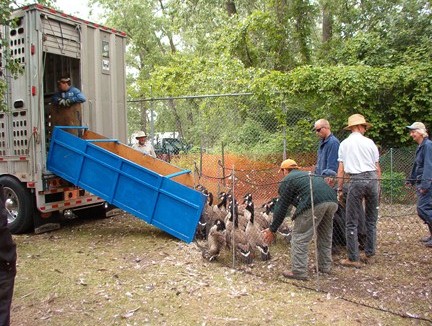Goose Program
A single Canada goose can:
- eat up to 1.4 kg of grass a day
- damage 0.5 square metres of turf every day
- produce more than 0.5 kg of feces every day
Therefore, when a large population of Canada geese inhabit an urban park:
- grass can become damaged by trampling and consumption
- feces pose health concerns to park users
- feces & feather droppings can harm water quality
How is the City dealing with unwanted Canada geese in parks?
We hire experienced contractors to closely monitor geese within Pickering, and to consult on responsible methods of control. There are two components to our goose control program - egg oiling and goose round up.
Egg oiling
With a permit from the Canadian Wildlife Service, trained contractors search common breeding areas, and place a vegetable-based, biodegradable oil on the eggs within 10 days of them being laid. This prevents the egg from developing and hatching.
Goose round up
Geese in specific areas are rounded up and relocated to an approved host location using a climate-controlled transport trailer. The round ups occur when the geese are molting and cannot fly away. They are also done early in the morning when the temperatures are cooler and there are few people in the park, to reduce stress to the birds. Goslings (baby geese) and their parents are not rounded up. No geese are harmed during this process.

A round-up requires a permit from the Canadian Wildlife Service (CWS). The City of Pickering's round ups are performed by Toronto and Region Conservation. Data from CWS indicates that only about 15% of the relocated birds will return to area.
Take Action
What can you do to help?
1. Do not feed the birds.
Wildlife experts note that bread and other human foods are a health risk to birds:
- hand feeding causes birds to concentrate in one location resulting in decreased water quality due to accumulated feces and feather droppings
- bread is low in nutrients and difficult to digest
- bread swells and causes birds to feel full, making them less likely to search for their natural foods, which contain proper nutritional value
- birds can get respiratory infections caused by mould from decaying bread
- birds that should migrate will not if they find sufficient food here; this may result in birds freezing during the winter months
2. Do not mow to the edge of the water.
Mowing the lawn right to the waters edge provides an attractive opportunity for geese. Modify your lawn care practices to allow for longer grasses along the waters edge. Consider planting native shrubs and tall grasses along the shoreline.
3. Learn more.
Visit the Government of Canada website for a list of frequently asked questions.
Contact Us
Sign up for City updates
Subscribe to receive City of Pickering updates, news, public notices and more.
